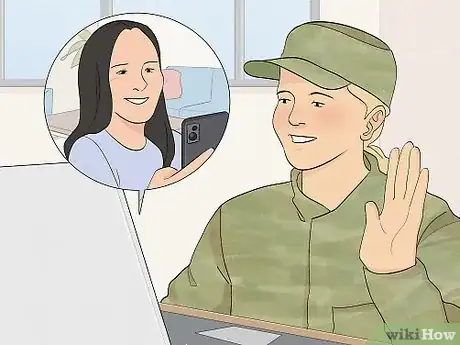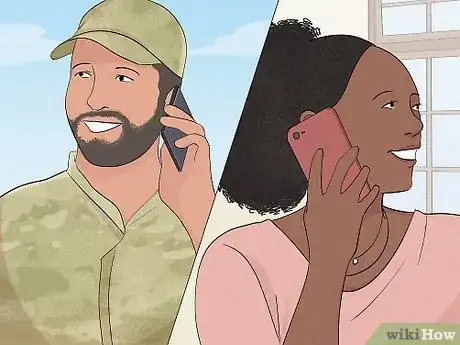This article was co-authored by Elvina Lui, MFT. Elvina Lui is a Licensed Marriage and Family Therapist specializing in relationship counseling based in the San Francisco Bay Area. Elvina received her Masters in Counseling from Western Seminary in 2007 and trained under the Asian Family Institute in San Francisco and the New Life Community Services in Santa Cruz. She has over 13 years of counseling experience and is trained in the harm reduction model.
This article has been viewed 96,969 times.
Armed forces have a duty to serve their country and they are prepared to deploy at a moment’s notice. This can be difficult when you’re in a relationship with someone in the military. These months away from one another will test the strength of your relationship. It definitely won’t be easy, but there are a variety of ways you can manage. Prepare ahead of time for deployment, carving out expectations. Communicate with your partner as much as you can while he or she is away. Try to keep busy on your end, and look into ways to manage emotionally in your partner's absence.
Steps
Outlining A Plan
-
1Start to talk about your plan for deployment. Before the deployment starts, you and your partner need to sit down and develop a plan. You'll need to talk about how the two of you will manage your time, seek support, and cope during deployment.
- The two of you need to help one another plan on how to manage. For the person being deployed, this means focusing on the mission, seeking support from other soldiers or military officials, and managing stress overseas. For the person staying home, this means fostering support at home, staying busy, and managing feelings of stress or anxiety when communication is limited.
- Try to have as honest and open a conversation as possible. Both of you should feel free to express your feelings, good or bad, about the impending separation. Feelings of jealousy and insecurity are normal when faced with a long separation.[1]
- Make time to spend alone and talk. Spend some one-on-one time at home together communicating. If you have children, hire a sitter for the night so you and your partner can talk.
-
2Figure out a plan for emergencies. In the event of an emergency, you need to have an action plan. How will you contact one another? Who at home should be on call to help handle emergencies? These are questions you should answer before deployment.
- If you're staying at home, know the quickest way to get ahold of your partner. You should also have someone on call, like a friend or family member, that can help you through emergencies while your partner is away.
- If you're leaving, know how your partner will be contacted in the event something happens to you. Talk to your partner about how you'll provide support from a distance in the event there's an emergency at home.
Advertisement -
3Talk about when and how often to communicate. Establishing groundwork for communication is important during deployment. You and your partner should have a game plan in mind in regards to how and how often you'll communicate.
- There are a variety of options for communication during military deployment. A phone is not always available, but things like e-mail, instant messaging, video chat, or regular mail are all options.
- If possible, setting aside a single day of the week to try and talk through a phone or video call may be helpful. If your deployment is fairly routine, you may know when you'll have access to a computer or phone. You can promise to call or video chat around a specific time during those days.
- You should also discuss what to do when communication is difficult. There may be times in deployment where access to things like telephones and computers is limited. Talk about what to do during these times. You can agree, for example, to resort to snail mail if necessary.
-
4Figure out a support system for both of you. You want to make sure both you and your partner have emotional support during deployment. It's a good idea to help one another form support networks prior to the beginning of deployment.
- For the party leaving, support may involve other soldiers or military members. You may also want to talk about other people you can communicate with long distance. In addition to being close with your partner, you probably have friends and family members that you have a close bond with. You should be able to rely on these people for support during deployment.
- If you're staying at home, you and your partner should figure out who you'll lean on. Talk about the family members and friends you'll have while your partner is away. You may find your partner's friends and family members can provide support during your deployment as well.
Communicating During Deployment
-
1Figure out your partner's language of love. It can be hard to provide support from a distance. Figuring out your partner's language of love can help you figure out the best way to help him or her feel secure. A person's language of love is how that person best feels supported and cared for. People respond best to different types of support and comfort.[2]
- Some people prefer words of affirmation to feel loved. Statements like, "I miss you" and "I love you" are helpful. If your partner seems to rely on words, try writing long letters and e-mails expressing how much you care.
- For some, actions are more important than words. People may feel supported if their partner shows they care through kind gestures, or sends gifts. If your partner prefers actions, you can send him or her care packages, make video messages, or periodically send gifts.
- Unfortunately, some languages of love are harder to cater to from a distance. Some people prefer physical touch and quality time to feel secure. This presents a challenge during deployment. However, you can try to help by telling your partner how much you miss his or her touch, and how you wish your partner was with you just to watch television together on a rainy night.
-
2Send care packages, if possible. If you're able to send care packages to where your partner is deployed, do so. A care package is a great gesture that can help your partner feel secure.[3]
- Include photos, treats, and small sentimental objects. Be creative. If your partner has a sense of humor, include a funny card or note.
- It can also be cute to send "coupons" for when your partner gets back. Something like, "Free for one good back rub" or "Free for a fancy dinner out." This can help give your partner something to look forward to when he or she returns.
- Make sure you check military regulations before sending out a care package. During deployment, there may be certain items that are banned.
-
3Avoid miscommunication in text. During deployment, you and your partner may be communicating through e-mail and text messages a lot of the time. Without verbal cues to help a person read emotions, miscommunication can be a problem. It's easy to misread text, reading benign words as angry. Work on finding ways to make sure your partner is able to understand you when face-to-face communication is not possible.[4]
- Pause before you send an e-mail or text. Read your words and think about any ways they may be misinterpreted. Could you read anger into this message? Frustration? Jealousy? If so, see if there's a way to reword or add an emoticon to make it clear this is a friendly message. For example, "I couldn't sleep without you last night" could be read as resentment, as in, "I'm disappointed you're not here." Instead, you could write, "I miss and love you so much that I couldn't sleep without you last night. <3"
- On your own end, remember you can never be 100% certain of intent when communication comes in writing. If you receive something from your partner you worry is angry or upset, try to remind yourself how common miscommunication is during these situations. Take some time to calm down, and then return the message asking, politely, for clarification if you feel you need it. For example, "I miss sleeping next to you too. Just to be clear, as I know it's easy to misread e-mails, you're not mad I'm gone, right? Just checking. :)"
-
4Keep one another informed on day-to-day happenings. Hearing about one another's daily lives will help you and your partner feel close. Share day-to-day happenings when you have the chance, even things that feel silly or trivial. Talk about your trip to the grocery store or who you ran into at the gym. This will make your partner feel like he or she is there with you.[5]
-
5Find creative ways to provide long distance support. E-mails, phone calls, and texts are a nice way to stay in touch. However, try to get a little creative as well. Your partner will feel valued if you think of fun, unconventional ways to communicate during deployment.[6]
- Make a scrapbook for when your partner gets back, detailing what happened when he was away. Scan images of the scrapbook and send them to your partner.
- E-mail your partner snippets of songs or clips from movies that have sentimental meaning to the two of you.
- Use smell as a memory. Smell is strongly linked to memory, so sending your partner a small container of a shampoo you use can provide him or her a small reminder of you.
- Read the same book together from a distance. This will help the two of you feel close, and give you something to discuss when your partner returns.
Keeping Busy
-
1Keep a journal. Journaling can be a great way to process your thoughts while your partner is away. You can also easily keep a journal if you're deployed. Write in a journal a few times a week, chronicling your thoughts and emotions regarding your partner's absence. When you and your partner are reunited, share some of the most heartfelt sections of your journal with your partner.[7]
-
2Explore your own interests. While distance is difficult, it can sometimes provide the opportunity for self-exploration and personal growth. While your partner is away, take this as a chance to explore some of your own interests and passions. Join a book club. Take a cooking class. Take up a new hobby, like running or knitting. Try to make the most of the time you have alone to better get to know yourself and your interests.[8]
- If you're deployed, it may not be difficult to keep busy. A particularly active deployment should keep your mind engaged. However, some deployments are less hectic than others. While it may be hard to, say, join a cooking class when deployed, you can look into solitary pursuits. You can try reading and writing, for example. Try to explore subjects that interest you by reading books on these subjects during your spare moments away.
-
3Find a support network. During your separation, you and your partner should both have access to healthy support networks. People are social by nature, and even if your partner is gone you need people you can reach out to.
- If you're being deployed, do not hesitate to get close to your fellow soldiers. Open up to them about your struggles and stress, and talk about how you're managing your long distance relationship.
- If you're staying at home, reach out to friends and family members. You should also reach out to your partner's friends and families. Spending time with people close to your partner can help you feel close to him or her from a distance.
-
4Keep things in perspective. It's important to keep things in perspective while your partner is away. Have friends and family members you can talk to when you feel frustrated or afraid in your partner's absence. If you know another person with a partner in the military, this person may be able to help you keep things in perspective. While this time is difficult, keep in mind it will not last forever. Try to keep in mind that things are temporary, and your relationship may be stronger after your partner returns.
- If you're deployed, some of your fellow soldiers have probably also left partners at home during deployment. Try to talk to fellow soldiers about how you're feeling, and ask them for advice on how to cope. Some soldiers have probably been deployed multiple times, and may have advice for you on how to keep things in perspective.
Managing Emotionally
-
1Work out issues on your end. Distance can create a lot of insecurity in a relationship. If you have preexisting issues with insecurity or trust, distance can intensify these feelings. Try to find ways to work on your own insecurities.[9]
- Talk about your insecurities with your partner and others. While you should not be accusatory when talking to your partner, it's okay to say you're feeling insecure. A little reassurance can go a long way.
- Examine your own issues with trust and insecurity. They may stem from a previous relationship. Try to understand that, while it's normal to worry when a partner is away, a lot of insecurity may be baseless.
-
2Accept personal growth will occur while you're apart. When you and your partner are reunited, you will both be slightly different. There is a large chunk of time the two of you did not share, and you both may have become more self-reliant during this time. Try to accept that, when your partner returns, your relationship may be different than it was before. This is not necessarily a bad thing. While you have both changed, this may be for the better. The two of you may feel more secure in the relationship after seeing it thrive from a distance.
-
3Have realistic expectations about communication. Communication will sometimes be difficult. Try to be understanding of this fact. There may be times when you don't hear from your partner for a few weeks. During these times, have others you can come to for support and care.
-
4Seek professional help, if necessary. Long distance can put a large amount of stress on a relationship. It's normal to feel insecure, but if you feel like the stress is becoming too much, seek out a therapist. A qualified therapist can help you work out your insecurities and find better ways to cope with distance. You can find a therapist by asking your regular doctor for a referral or seeing what's covered under your insurance. If you are in school, you may be entitled to free counseling through your university.
Expert Q&A
-
QuestionDo military relationships last?
 Elvina Lui, MFTElvina Lui is a Licensed Marriage and Family Therapist specializing in relationship counseling based in the San Francisco Bay Area. Elvina received her Masters in Counseling from Western Seminary in 2007 and trained under the Asian Family Institute in San Francisco and the New Life Community Services in Santa Cruz. She has over 13 years of counseling experience and is trained in the harm reduction model.
Elvina Lui, MFTElvina Lui is a Licensed Marriage and Family Therapist specializing in relationship counseling based in the San Francisco Bay Area. Elvina received her Masters in Counseling from Western Seminary in 2007 and trained under the Asian Family Institute in San Francisco and the New Life Community Services in Santa Cruz. She has over 13 years of counseling experience and is trained in the harm reduction model.
Marriage & Family Therapist Yes, they definitely can. In fact, many long distance relationships do well if one person is in an isolated or stressful situation like deployment. The difficulty will mean the two of you will be emotionally tight with each other. From my own clinical observations, deployment caused long distance relationships are fine until the person comes back, because the deployment actually forced them to be supportive and loving towards each other.
Yes, they definitely can. In fact, many long distance relationships do well if one person is in an isolated or stressful situation like deployment. The difficulty will mean the two of you will be emotionally tight with each other. From my own clinical observations, deployment caused long distance relationships are fine until the person comes back, because the deployment actually forced them to be supportive and loving towards each other.
References
- ↑ http://www.militaryonesource.mil/deployment-and-transition/during-deployment?content_id=282453
- ↑ http://www.5lovelanguages.com/
- ↑ http://www.militaryonesource.mil/deployment-and-transition/during-deployment?content_id=282453
- ↑ https://www.psychologytoday.com/blog/contemporary-psychoanalysis-in-action/201502/why-is-there-so-much-miscommunication-email-and
- ↑ http://www.militaryonesource.mil/deployment-and-transition/during-deployment?content_id=282453
- ↑ http://www.operationwearehere.com/ConnectionDuringDeployment.html
- ↑ http://www.militaryonesource.mil/deployment-and-transition/during-deployment?content_id=282453
- ↑ http://psychcentral.com/lib/7-tips-for-long-distance-couples/
- ↑ http://psychcentral.com/lib/7-tips-for-long-distance-couples/












































































